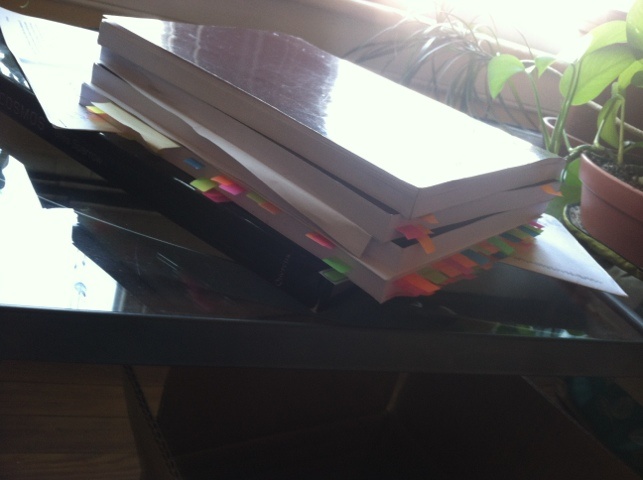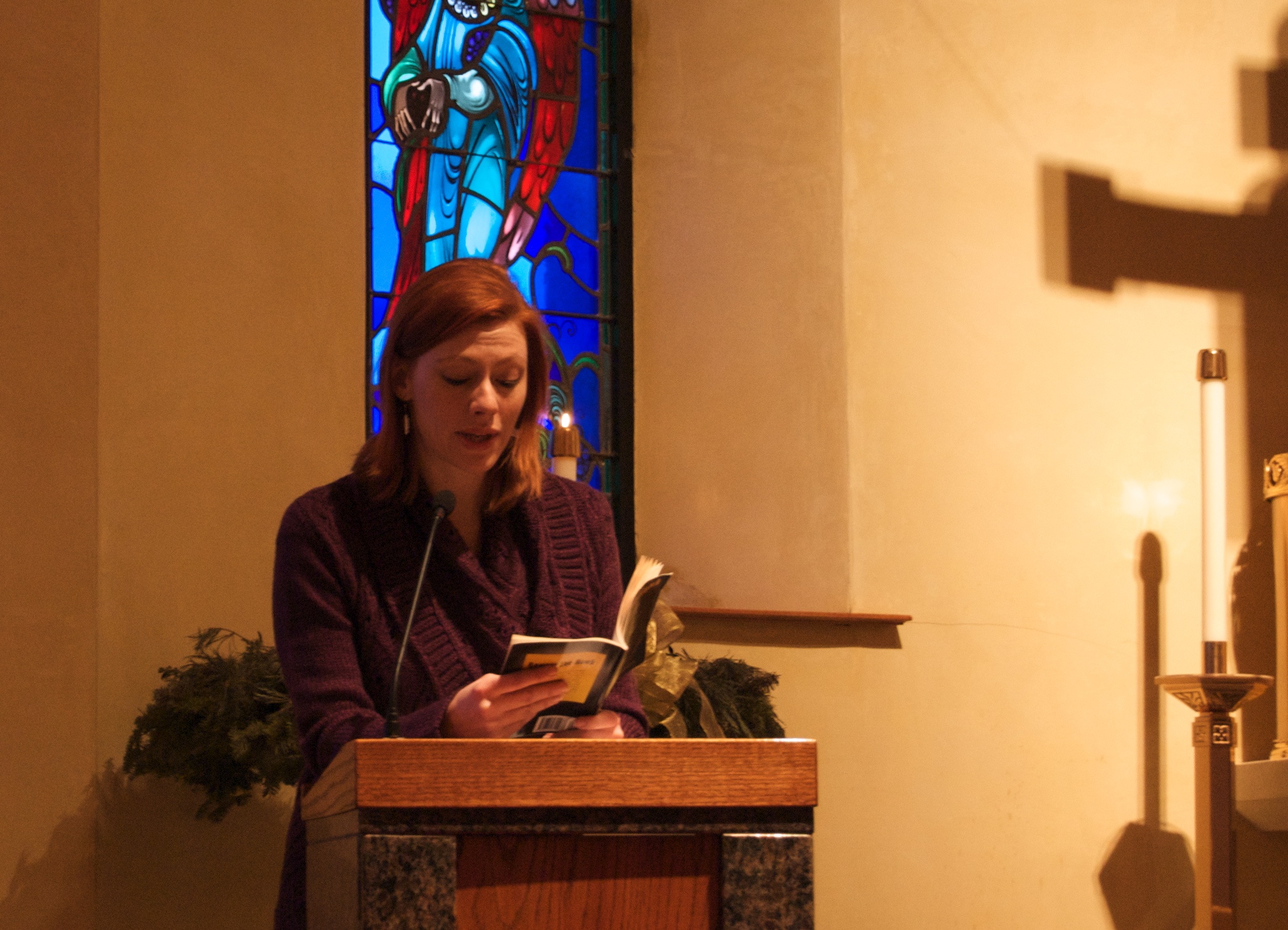Last week, I sat down with one of my writers’ groups to discuss the novel I’ve been working on.

Marked-up first drafts of the novel. I have a lot of work to do.
I’ve posted ad nauseum about my troubles revising this project, which served as my creative thesis when I graduated from the Fairfield MFA program. I tried retyping the novel. I read chapters in craft books. I made timelines. I set goals. I wrote new scenes. Nothing seemed to work. I didn’t feel like I was making the structure of the plot any cleaner or stronger. I felt like I was cluttering it.
So last Wednesday, when I sat down with the members of a writing group who had read the whole first draft of my book, I was a little apprehensive. I’d read it myself and noticed lots of holes where I thought there were none. I noticed lots of mistakes. I was certain that my three colleagues – Daisy Abreu, Robert McGuire, and Ioanna Opidee (who starts her own revisions today) – would pull the thing apart.
Except they didn’t.They gave me lots of good advice and three marked-up copies, and this will sound cheesy, but they also gave me hope for a story I’ve been falling out of love with.
And here’s another thing a member of that writing group gave me: notes on revisions for this blog post.
A few weeks back, I asked my readers for revision advice. Robert McGuire, who interviewed me earlier this year for his blog, Working on a Novel, wrote these notes on revision after I chided him for not commenting on that post. I’ve edited out some of the specific references to my novel, but I want to share his advice with all the writers who happen upon this blog.
Robert’s advice is really on point. He teaches writing at the college level and is very disciplined when it comes to his own craft, and his advice is worth reading. Also, his blog, Working on a Novel, is an electronic journal inspired by John Steinbeck’s Journal of a Novel, the diary/letters/journal that Steinbeck kept while writing East of Eden. I’m reading that now (Robert has kindly loaned me his copy) and I’ve begun journaling in the morning before work, as Steinbeck did. I don’t know if this journaling will last, but right now, it’s helpful. I realized that one of the things I lack now is someone to talk to about my work. When I was in my MFA program, I was constantly talking about my novel. I talked to my mentors and teachers about the work I was doing. I talked to other students. I was immersed in the story and in the lives of the characters. Now there’s not nearly as much chatter about the work I’m doing and if I want to stay immersed, I have to talk to myself. I find that so far, it’s been helpful.
But enough from me. Here’s Robert:
Wheww. Congratulations on writing a complete draft of a complete novel. One foot in front of the other. It’s a big achievement.
…
First, let me give my response to your blog post about how to revise.
Craft books, of course! No, actually, when I have been at this stage with my books, I discovered that it’s really hard to find good practical advice about the revision process. Drafting, yes. Editing and proofreading, yes. But not RE-vising. The big messy muddle in the middle doesn’t seem to get as much attention.
Nevertheless, a couple sources spring to mind. I really like the Jane Smiley book, Thirteen Ways of Looking At a Novel, and in it she has two chapters especially about writing, the second of them being about how to look at your draft and look at it critically. I also benefited from some focus/prompt questions I found in one chapter of an otherwise unremarkable book by Jesse Lee Kercheval called Building Fiction.
One technique I remember picking up somewhere was to think of the plot in terms of questions that were posed by the book and that the reader was asked to care about. The idea being that you want to provoke questions in the reader’s mind – plot-wise, character-development-wise and thematically – and ultimately satisfy those questions. I had a little diagram, totally unique to my book, that had surface-level plot questions and more implicit thematic questions, some that pulled the narrative along for only a section (i.e. the “acts” in your book) and some that were overarching for the whole book. Then I would go through and ask how each scene interacted with those questions. Was the scene relevant to the focus questions? Keep the reader caring about the questions? Complicating things without digressing? That was a big help in figuring out what each scene needed to make it work as part of the whole.
Another way of thinking about the revision process is to think in terms of SAYS vs. DOES. (I take this from first-year composition texts.) This scene/book/graf/whatever SAYS ____. This scene DOES _____. I suppose it’s another way of thinking about the difference between what’s explicit and what’s implicit. And I suppose it helps connect a given scene to the whole. Because a scene can say something very well within its own boundaries but to do anything effectively, it has to be in communication with the rest of the book. At an early stage of revision, I would worry less about what a scene says than what it does. Ask yourself what the scene is doing to move the story forward, escalate tension, establish character, etc. When the answer isn’t clear, then you know you’ve got work to do. I suppose the follow up question is to ask yourself what the scene should do.
You and I have probably have opposite styles on the issue of “overwriting.” For the sake of getting another POV on the table, I’ll argue for not worrying too much about your father’s warning against overworking the book if for no other reason than it’s easier for writers to erase than for painters. Kidding myself about how good my work is a clear and present danger, and overworking it is only a theoretical possibility.
One of the main principles that make sense to me is the idea that revision is re-envisioning the book. Seeing it again. Seeing what it is and what it needs and what it could be. Seeing it differently. It’s really easy to get lost in line edits and feel like progress is being made when what’s really needed is a bigger picture re-evaluation. Of course, there aren’t bright lines between these stages, and it probably happens sometimes that struggling with a line edit reveals the larger structure of the book.
Last bit of experience: When I was drafting my first book, I noticed that I kept myself motivated by a kind of unconscious mantra. Just add sentences. No matter what, keep moving forward. Don’t worry about how good it is. Then when I was bogged down during the revision stage I figured out I needed another regular, simple reminder of what the work was. I finally settled on one. Dig. Don’t fix. Whenever I was tempted to fix something, it turned out I was avoiding something more essential. I needed to get down in the mud and make some more mud pies first.
There’s some of this POV that I think applies to your draft, and I’ll share that when our writing group gets together to discuss it. Good luck!


